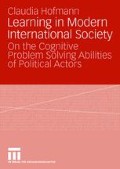Abstract
Constructing a learning model for international politics is a highly complex task as well as a highly unrewarding one. Much has been written on the very basics of learning in international politics, consulting literature from a wide variety of theoretical and methodological perspectives. But at present, these different perspectives have prevented scholars to put it all together. Firstly, there are conceptual difficulties, especially between the diametrically opposed social constructivists and rationalists. While social constructivist approaches (based on cognitive experiential psychology and the symbolic interactionism of George Herbert Mead in particular) build their analysis on the mutual constitution of the actor and the structure, rationalist approaches (based on economic theories such as those by John Stuart Mill and Adam Smith) build their analysis on individual rationality, proposing an essentialist human individual nature irrespective of group dynamics. Actors’ behaviour, therefore, depends on very different images: For social constructivists, actor behaviour may depend on mutual learning and the discovery of new preferences through a non-instrumental choice mechanism in an interactive environment. For rationalists, actor behaviour stems from coercion, instrumental calculation and incentives (material as well as social). The choice mechanism is cost-benefit calculations in an environment of strategic interaction (Checkel 2001: 555–560). Accordingly, the two camps have developed a distinctly different view on norms: Social constructivist approaches see norms and values as constitutive of practice, while rational scholars see them as attributes of actors, ontologising norms as unchangeable and putting the state another billiard ball aside (Wolfers 1962: 19–24). No agreement could be established whether norms and values are endogenous and alterable (social constructivists) or whether they are exogenously given and unchangeable (rationalists).
Access this chapter
Tax calculation will be finalised at checkout
Purchases are for personal use only
Preview
Unable to display preview. Download preview PDF.
Rights and permissions
Copyright information
© 2008 VS Verlag für Sozialwissenschaften | GWV Fachverlage GmbH, Wiesbaden
About this chapter
Cite this chapter
(2008). Constructing International Politics. In: Learning in Modern International Society. VS Verlag für Sozialwissenschaften. https://doi.org/10.1007/978-3-531-90789-5_2
Download citation
DOI: https://doi.org/10.1007/978-3-531-90789-5_2
Publisher Name: VS Verlag für Sozialwissenschaften
Print ISBN: 978-3-531-15635-4
Online ISBN: 978-3-531-90789-5
eBook Packages: Humanities, Social Sciences and LawPolitical Science and International Studies (R0)

